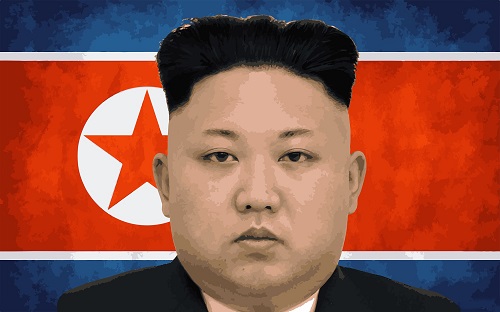
North Korea may seem like an odd choice for a white nationalist’s utopia, but then these are odd times. A significant portion of the Alt-Right has become enchanted with, or at least willing to defend, the world’s foremost bastion of Stalinism. In North Korea, racialists believe they have spied a model of their own nationalism, anti-Americanism, and hatred of free enterprise.
“North Korea is the only ethno-nationalist state opposing the current world order, and as long as it exists, it will stand as an example (and a possible future ally) for ethnic and racial nationalists everywhere,” wrote Greg Paulson at the online journal Counter Currents, which styles itself an intellectual powerhouse of the Alt-Right, “especially those of us in the West who see the only hope for our people in the destruction of the current world order.”
Appreciation for North Korea has spread in recent years. Matthew Heimbach, an organizer of the Charlottesville rally just released from jail two week ago for a separate assault, said that “North Korea is a nation that stands against imperialism and globalism around the world.” And he believes it does so on racial grounds. “The very identity of the nation comes from an actual national socialist perspective, specifically also deriving elements from Japanese fascism,” he said.
The assessment borrows from B.R. Myers’ book, The Cleanest Race: How North Koreans See Themselves and Why It Matters, which says the 35-year-long Japanese occupation led Koreans to organize society around their own racially superior self-image.
Hence, North Korea’s birth as an Alt-Right symbol of The Resistance. David Duke, who is regarded as an elder statesman by the Racialist Right, has offered support ranging from the innocuous to the indefensible. One of the growing number of articles on Duke’s website devoted to the subject states that Israeli manipulation is “the real reason” for hostilities between the U.S. and North Korea. Another implies that the late Otto Warmbier was an Israeli spy.
Others have joined his chorus of North Korean apologetics.
“North Korea is not communist, plain and simple,” wrote Paulson. Instead, the nation follows a governing philosophy known as Juche, “the spirit of self-reliance.” This is important, as the Alt-Right believes free enterprise destroys national cultures and eventually leads to miscegenation. (Michael Matheson Miller analyzes the relationship between commerce and cultures in his annual Acton University presentation, “Cultural Critiques of Capitalism.”) Paulson writes:
While I don’t agree with the extent of the state-control of the economy in North Korea (i.e. controlling consumption), I certainly have no loyalty to the capitalist system, which I see as racially corrosive, among other things. And let us not forget the whole reason the United States got involved in the Korean civil war was to defend (or impose) capitalism and by extension the ruling international financial order.
Essentially I admire North Korea because it is in direct opposition to the hostile ruling elite in the West and the globalist destruction of distinct peoples and nations.
Such devotion can spin the nation’s foremost problem into an asset.
The article listed among its “Reasons to admire North Korea” the nation’s reportedly high average IQ and its pandemic starvation.
True, North Korea “has struggled to adequately feed some portions of its population, but that is the price of independence for them, and they are willing to pay it – and for that alone the North Koreans get my respect. … [T]hey seem willing to die to maintain their independence.”
As many as 2.5 million North Koreans starved to death during the 1990s. Presently, 10.5 million North Koreans are “undernourished,” 28 percent of children under five have their growth stunted, and 4.4 million citizens are in a state of “crisis, emergency and famine.” Yet North Korea’s military budget is an estimated one-quarter of its GDP – and both the Korean People’s Army and Kim Jong Un appear well-fed.
These are not sacrifices willingly undertaken to secure their independence but deprivations ruthlessly imposed to maintain their enslavement.
The same aim lies behind the cult of personality, which attributes magical powers to successive incumbents of the Kim dynasty. This, too, the Alt-Right is willing to countenance, because the cult replaces other ideologies…and religions.
“Nothing North Koreans believe comes close to matching the absurdity of Christianity, Marxism, Freudism, Diversityism, feminism or racial egalitarianism,” wrote Richard Hoste in his review of Myers’ book for Counter Currents.
Similar hostility to the modern world has forged an intellectual, if not ethnic, kinship between North Korea and the Alt-Right. Should the peninsula reunite and “choose to reject all aspects of multiculturalism I will be the first ones [sic] to cheer them on,” Hoste wrote.
Heimbach even offered his services as North Korea’s equivalent of Tokyo Rose. (Pyongyang Pete?) “I’ve thought about going and giving a tour, or something like that, especially if the DPRK government wanted to be able to reach out to Americans,” Heimbach said last year. “That would definitely be an invitation that I would be more than happy to accept.”
The Alt-Right’s embrace of North Korea shows how far from reason their cocktail of fervid racialism, obscurantism, and anti-capitalism can take them.
For a more accurate view of North Korea, see here, here, here, here, and here.
(Photo credit: Public domain.)

